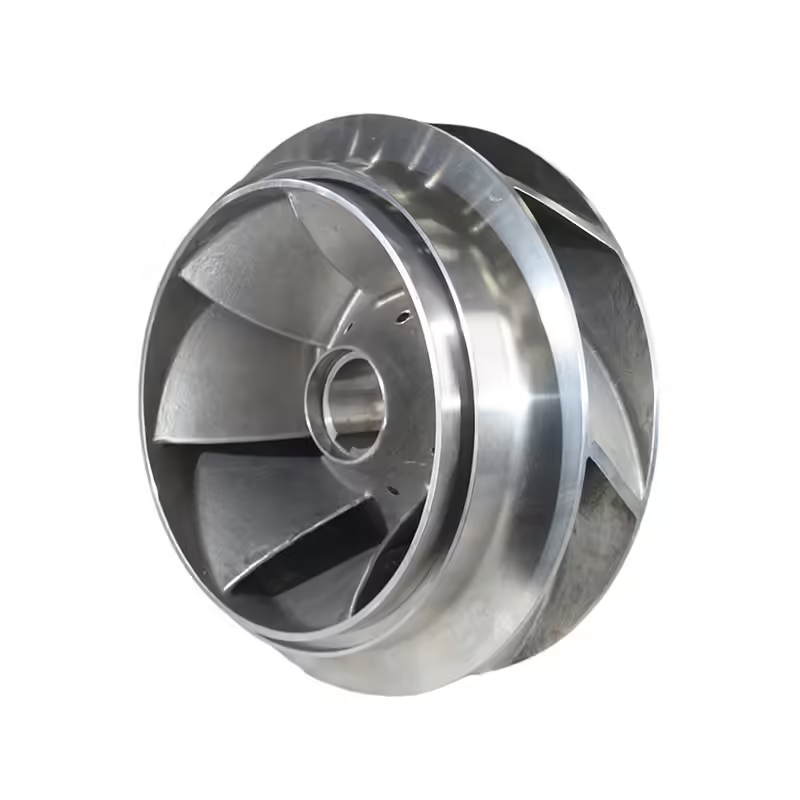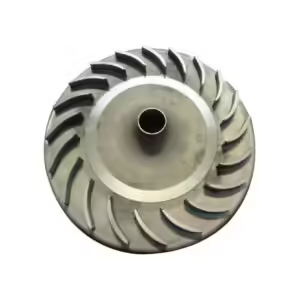Lohnt sich ein China Casting Impeller wirklich? 4 Fakten
Willkommen auf meinem Blog!
Ich freue mich sehr, dass du hier bist! Bevor wir uns in die Inhalte vertiefen, würde ich mich freuen, wenn du mir auf meinen Social-Media-Plattformen folgst. Dort teile ich zusätzliche Einblicke, vernetze mich mit unserer großartigen Community und halte dich über die neuesten Nachrichten auf dem Laufenden. So bleibst du in Verbindung:
📘 Facebook: Shanghai Leierwo Industriehandel Co., Ltd.
Lassen Sie uns gemeinsam auf diese Reise gehen! Ich hoffe, Sie finden die Inhalte hier nicht nur aufschlussreich, sondern auch inspirierend und wertvoll. Los geht‘s!
Inhaltsverzeichnis
Einführung

In the global manufacturing world, the term “China casting impeller” has gained significant traction over recent years. For industries relying on centrifugal pumps, compressors, and turbines, the impeller is a critical component. The increasing demand for cost-effective yet durable solutions has turned the spotlight toward China-based casting facilities. But with this spotlight comes a common question: is a China casting impeller really worth it?
This article explores the practical realities, performance advantages, and potential concerns surrounding China casting impeller products. Whether you are a procurement manager, engineer, or business owner looking to enhance your equipment’s performance, the insights provided here will help you make informed decisions.
What Is a China Casting Impeller?
A China casting impeller refers to an impeller manufactured in China using various casting processes such as sand casting, investment casting, or die casting. These impellers are used across a wide range of applications including:
- Wasser- und Abwasseraufbereitung
- Oil and gas pipelines
- HVAC systems
- Food and chemical processing
Chinese manufacturers have become well-known for their competitive pricing and rapidly improving quality. These impellers come in diverse shapes and sizes and can be produced using different metals like stainless steel, bronze, or cast iron depending on the specific industrial needs.
Fact 1: High Material Versatility
One of the most praised aspects of choosing a China casting impeller is the broad range of material options available. Whether the application demands corrosion-resistant alloys or high-strength steel, manufacturers in China have the capability to provide customized material compositions to meet various performance requirements.
This material diversity means industries across sectors—whether it’s chemical processing, wastewater management, or marine operations—can select the optimal impeller material for their unique operational environments. For example, in highly corrosive conditions such as acidic liquid transfer, a stainless-steel China casting impeller ensures prolonged service life and minimal maintenance. Conversely, for cost-sensitive applications with lower wear expectations, cast iron becomes the go-to option.
Here’s a closer look at common materials:
- Edelstahl: Ideal for corrosive environments, such as those involving saltwater or acidic chemicals. Stainless-steel impellers not only resist rust but also provide high strength and wear resistance over time. They are commonly used in the food industry, marine pumps, and pharmaceutical processing.
- Bronze: Excellent for marine and low-friction applications, bronze impellers are favored for their anti-corrosive nature and smooth operation. This material also resists cavitation damage and is less likely to seize compared to steel in pump systems.
- Gusseisen: Cost-effective and widely used in general-purpose pump applications, cast iron offers excellent machinability and acceptable strength for most non-corrosive environments. It’s the default choice when balancing performance with tight budgets.
In addition to the basic material options, manufacturers in China offer alloy modifications and specialized surface treatments, such as hardening, coating, or polishing. This flexibility ensures that companies can get impellers tailored specifically to their working conditions without excessive costs or production delays.
Fact 2: Cost-Effectiveness Without Compromising Quality
A major reason many industries turn to China casting impeller production is due to the favorable price-to-performance ratio. China benefits from a vast industrial ecosystem, which allows for efficient bulk production, access to raw materials, and labor cost advantages. This results in significantly lower manufacturing costs compared to Western or Japanese counterparts.
But low cost does not mean cutting corners on quality. In fact, many China casting impeller suppliers are now producing under strict international certifications, such as:
- ISO 9001: Quality management systems
- ISO 14001: Environmental management
- ASTM and EN material standard compliance
Quality control processes often include inspection of raw materials, non-destructive testing (NDT), dynamic balancing, and final performance testing under simulated working conditions.
Additionally, many factories have adopted Lean Manufacturing principles, Six Sigma practices, and ERP systems to minimize waste and ensure traceability throughout the production cycle. As a result, impellers made in China are now regularly found in high-stakes industrial applications, including municipal waterworks, oil refineries, and ship engine systems.
Moreover, Chinese suppliers are open to third-party inspections. Many international buyers hire independent inspection agencies to verify dimensional accuracy, material composition, and functional performance before shipment. This practice offers reassurance and confirms that affordable pricing does not come at the expense of reliability.
Cost-effective manufacturing, coupled with enhanced transparency and accountability, is a key reason why the China casting impeller industry continues to grow its presence globally.
Fact 3: Growing Technological Innovation in Chinese Casting Facilities

Chinese foundries are not just about manual labor anymore. Many of them now leverage cutting-edge teGone are the days when Chinese foundries relied solely on manual labor and rudimentary tools. Today, many China casting impeller manufacturers are embracing state-of-the-art production technology to improve output precision and quality.
Key innovations include:
- CAD/CAM (Computer-Aided Design/Manufacturing): Engineers can now digitally model complex impeller geometries before production begins. This reduces design errors and speeds up prototyping.
- CFD (Computational Fluid Dynamics) Simulation: Used during the design phase to analyze and optimize fluid flow, blade angles, and turbulence zones, ensuring that the final product maximizes pump efficiency.
- CNC-Bearbeitung: Precision equipment ensures accurate dimensions and uniform surface finishes. CNC turning and milling are especially critical in maintaining tight tolerances for the impeller bore and blades.
- NDT (Non-Destructive Testing): Ultrasonic testing, radiographic inspection, and magnetic particle testing are increasingly standard to identify internal flaws without damaging the product.
These technologies allow manufacturers to improve not only product quality but also turnaround time and manufacturing consistency. The result is a China casting impeller that performs on par with—if not better than—similar products from Europe or North America.
Furthermore, some top-tier foundries are partnering with research universities and industrial R&D centers to stay at the forefront of casting metallurgy and performance engineering. This collaborative approach is fueling faster innovation cycles and greater product customization for global clients.
Fact 4: Excellent Customization and Delivery Capabilities
Chinese manufacturers have also developed a reputation for being highly adaptable and responsive to customer demands. Whether it’s a one-off prototype or a full production run of thousands of units, many China casting impeller suppliers excel in accommodating a wide range of customization requests.
Customization can include:
- Altering blade thickness, curvature, or diameter
- Using unique alloy blends for niche applications
- Applying specialized surface coatings (e.g., anti-cavitation, Teflon, ceramic)
- Dynamic balancing for high-speed impeller rotation
- Incorporating customer logos or serial tracking IDs
In addition to engineering flexibility, Chinese manufacturers are known for their efficient logistics. Most facilities maintain an agile production schedule, supported by just-in-time (JIT) systems and digital workflow tools. Lead times can be as short as one to three weeks, even for non-standard orders.
When compared to Western suppliers—whose lead times may extend to several months due to labor shortages or energy constraints—China’s responsiveness gives it a major competitive edge.
Moreover, Chinese suppliers often provide regular progress reports, video walk-throughs of production lines, and digital inspection reports to build client confidence. This transparency enhances communication and fosters trust, particularly in overseas transactions.
Performance Comparison Table
| Besonderheit | China Casting Impeller | Local Casting (US/EU) | Off-the-Shelf Imports |
|---|---|---|---|
| Kosteneffizienz | Hoch | Medium | Niedrig |
| Customization Options | Umfangreich | Beschränkt | Minimal |
| Material Versatility | Wide Range | Mäßig | Narrow |
| Lieferzeit | Short (1–3 weeks typical) | Moderate to Long | Long |
| Compliance with Standards | ISO, ASTM, EN | ISO, ASTM | Varies |
| Technological Integration | Increasing | Hoch | Niedrig bis mittel |
Considerations When Choosing a China Casting Impeller

While the benefits are substantial, it’s important to consider the following factors to ensure the best outcome:
- Supplier Verification: Choose ISO-certified and audited manufacturers.
- Material Certification: Always request documentation for the alloy and performance grades.
- Kommunikation: Establish clear communication channels to avoid design or production errors.
- Shipping and Tariff Regulations: Consider import duties, taxes, and freight logistics.
By addressing these considerations proactively, many businesses have successfully integrated China casting impeller components into their production lines with outstanding results.
Abschluss
Absolutely. When selected with care, a China casting impeller can offer unmatched value in terms of performance, cost, and flexibility. With improvements in quality assurance, technology adoption, and customization capacity, Chinese casting manufacturers are now seen as global players in industrial solutions.
For companies looking to maintain a balance between quality and cost efficiency, turning to a reliable China casting impeller provider is indeed a smart move. If you’re considering enhancing your pump or turbine systems, exploring options from reputable Chinese suppliers could be your next strategic advantage.
Häufig gestellte Fragen
What industries commonly use China casting impeller products?
Industries like water treatment, oil & gas, HVAC, chemical processing, and mining frequently use these impellers for their critical rotating equipment.
Sind China casting impeller products reliable?
Yes, many Chinese manufacturers adhere to global standards and conduct rigorous testing to ensure durability and precision.
How do I ensure quality when sourcing a China casting impeller?
Request material certifications, look for ISO certifications, and consider doing third-party inspections before shipment.
Can I customize the design of a China casting impeller?
Most suppliers offer extensive customization, including material type, dimensions, blade angles, and balancing.
What is the typical lead time for a China casting impeller?
Lead times generally range from 1 to 3 weeks depending on complexity and order volume, which is often faster than many domestic alternatives.
Produktkategorien
- Ventilteile
- Wasserpumpenteile
- Lagergehäuseteile
- Druckgussteile
- Pumpenprodukte aus Edelstahl
- Pumpenprodukte aus Gusseisen
- Ventilteile für den Automobilgebrauch
- Autoteile
- Ventilteile für den zivilen Gebrauch
- Vakuumpumpenteile KF

